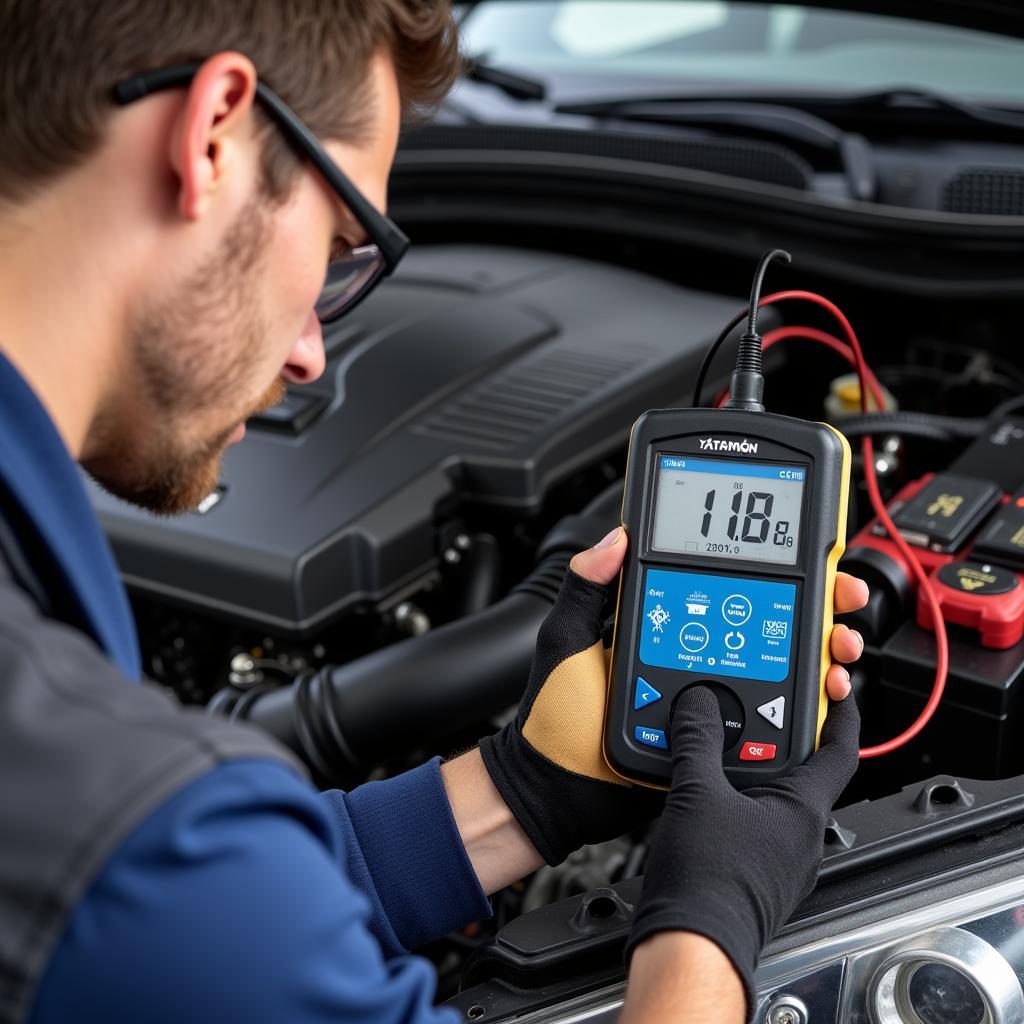A 12.1 volts car battery reading can be a cause for concern, leaving you wondering if it’s time for a replacement. While it might seem okay on the surface, this voltage isn’t ideal and could indicate underlying issues. This guide delves into the complexities of car battery voltage, helping you understand what 12.1 volts means for your vehicle and what steps you should take.
Understanding Car Battery Voltage
A fully charged car battery should typically read around 12.6 volts or higher. 12.1 volts suggests your battery is not at its full potential and could be experiencing a slow discharge. This could be due to various reasons, ranging from a parasitic drain to simply an aging battery. Understanding the intricacies of battery voltage is crucial for accurate diagnosis.
What Does 12.1 Volts Indicate?
A 12.1 volts reading indicates your car battery is at approximately 25% charge. While it might still have enough power to start your car, particularly in warmer weather, its capacity is significantly reduced. This weakened state makes it susceptible to failure, especially during cold weather or when faced with increased electrical demands.
Why is My Car Battery Only at 12.1 Volts?
Several factors can contribute to a 12.1 volts reading. These include:
- Old Age: As batteries age, their capacity to hold a charge diminishes.
- Parasitic Drain: Electronic components drawing power even when the car is off can slowly drain the battery.
- Alternator Issues: A malfunctioning alternator might not be charging the battery effectively.
- Extreme Temperatures: Both extreme heat and cold can negatively impact battery performance and charge.
- Short Trips: Frequent short trips don’t allow the alternator sufficient time to fully recharge the battery.
- Corroded Terminals: Corrosion on the battery terminals can hinder the flow of electricity.
Troubleshooting a 12.1 Volts Car Battery
Identifying the root cause of the low voltage is crucial for effective troubleshooting. Here’s a step-by-step guide:
- Check the Battery Terminals: Inspect the terminals for corrosion. Clean them with a wire brush and baking soda solution if necessary.
- Test the Battery with a Multimeter: Measure the voltage with the engine off and then again while the engine is running. A running engine should show a voltage between 13.7 and 14.7 volts, indicating a functioning alternator.
- Perform a Load Test: A load test checks the battery’s ability to hold a charge under load. This test requires specialized equipment and can be performed at most auto parts stores.
- Check for Parasitic Drains: Use an ammeter to measure the current draw with the ignition off. A high reading suggests a parasitic drain.
 Performing a Car Battery Load Test
Performing a Car Battery Load Test
When to Replace a 12.1 Volts Car Battery
While a 12.1 volts battery might still function, its reduced capacity puts you at risk of unexpected breakdowns. If the battery is old or failing a load test, replacement is often the most prudent course of action. Continuing to use a weakened battery can lead to further complications and potentially damage other electrical components.
Expert Insight
“A 12.1 volt reading is a clear sign of a weakened battery,” says John Smith, Automotive Electrical Engineer at Smith Automotive Solutions. “While it might still start your car now, its reliability is compromised. Proactive replacement prevents future headaches.”
Conclusion
A 12.1 volts car battery is not necessarily bad, but it’s certainly not optimal. This reduced voltage indicates a weakened state and potential underlying problems. By understanding the causes and performing appropriate troubleshooting steps, you can make informed decisions about whether to recharge or replace your battery. Addressing this issue proactively prevents unexpected breakdowns and ensures the reliable operation of your vehicle.
FAQ
- Can I recharge a 12.1 volts car battery? Yes, you can try recharging it with a battery charger, but if the battery is old or damaged, it might not hold a charge effectively.
- How long does a car battery last? Typically, car batteries last between 3 and 5 years, depending on usage and climate.
- What are signs of a bad car battery besides low voltage? Other signs include slow engine cranking, dimming headlights, and clicking sounds when turning the key.
- How much does a car battery replacement cost? The cost varies depending on the battery type and your vehicle, but it typically ranges from $100 to $300.
- Can I jump-start a car with a 12.1 volts battery? You can likely jump-start it, but it’s crucial to address the underlying cause of the low voltage afterward.
- How do I dispose of an old car battery? Most auto parts stores and recycling centers accept old car batteries for proper disposal.
- Does driving habits affect car battery life? Yes, short trips and frequent starts can shorten battery life.



